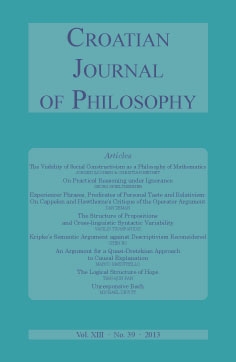Experiencer Phrases, Predicates of Personal Taste and Relativism: On Cappelen and Hawthorne’s Critique of the Operator Argument
Experiencer Phrases, Predicates of Personal Taste and Relativism: On Cappelen and Hawthorne’s Critique of the Operator Argument
Author(s): Dan ZemanSubject(s): Philosophy
Published by: KruZak
Keywords: The Operator Argument; predicates of personal taste; experiencer phrases; contextualism; relativism.
Summary/Abstract: In the debate between relativism and contextualism about various expressions, the Operator Argument, initially proposed by Kaplan (1989), has been taken to support relativism. However, one widespread reaction against the argument has taken the form of arguing against one assumption made by Kaplan: namely, that certain natural language expressions are best treated as sentential operators. Focusing on the only extant version of the Operator Argument proposed in connection to predicates of personal taste such as “tasty” and experiencer phrases such as “for Anna” (that of Kölbel (2009)), in this paper I investigate whether the reasons offered by Cappelen and Hawthorne (2009) against various assumptions of the argument failing in the case of modal, temporal, locational and precisional expressions transfer to the case of experiencer phrases to undercut support for relativism about predicates of personal taste. My aim is to show that they don’t. Thus, I fi rst show that their considerations against experiencer phrases such as “for Anna” being sentential operators are not decisive. Second, I show that even if granting that such experiencer phrases are not sentential operators, a suitably modifi ed version of the Operator Argument can be defended from the objections they raise.
Journal: Croatian Journal of Philosophy
- Issue Year: XIII/2013
- Issue No: 39
- Page Range: 375-398
- Page Count: 24
- Language: English
- Content File-PDF

